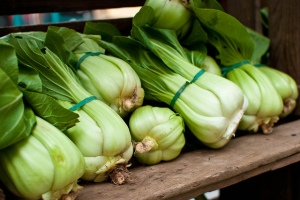
After being introduced to bok choy by my Chinese friends, I iimmediately fell in love. I have been making it a habit to eat vegetables as my main dish for dinner and bok choy continues to find its way to my plate. This plant is very healthy and extremley easy to prepare for a meal.
The Health Benefits of Bok Choy
- Part of the cruciferous vegetable family (think broccoli, cabbage, brussell sprouts) and its consumption correlates with lower cancer rates
- Contains a high amount of beta-carotene (vitamin A)
- Rich in antioxidant nutrients which also provide anti-inflammatory benefits
- High in omega-3 with a significant amount of apha-linolenic acid (ALA) and vitamin K
Buying and Storing
Bok choy is available throughout the year but its peak season is during winter and spring. The popularity of bok choy has increased to the point that many grocery stores in America now readily carry it. Healthy bok choy is firm with brightly colored grean leaves and firm stems. Purchase bok choy with healthy looking leaves that are unwilted and free from signs of yellowing and small holes.
In Asian grocery stores, bok choy is often stored in a plastic bag to keep it fresh and to help retain the vitamin C content. If properly stored in a cool eenvironmentsuch as the refrigerator crisper, bok choy will stay fresh for about one week.
Cooking Healthy Bok Choy
My favorite way of preparing bok choy is by a quick saute which requires no oil and retains much of the flavor and nutrients.
Ingredients
1 lb bok choy
1 garlic clove
1 TBS of chopped ginger
5 TBS of vegetable or chicken broth
Sea salt and pepper to taste
Directions
1. Chop bok choy in half, length wise for even cooking. Chop garlic and ginger in to small pieces
2. In a large skillet, heat broth until the liquid begins to steam. Add bok choy and saute until tender.
3. Transfer to a serving dish and season with salt, pepper, and olive oil and any additional ingredients you may prefer.
